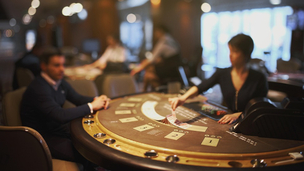Reboots and Throwbacks: Is 2020 the Year of Video Game Nostalgia?
Reboots and Throwbacks: Is 2020 the Year of Video Game Nostalgia?
The year has been a prodigious one for the video game industry. We have seen a marked shift toward a new era of gaming, typified – and, in part, driven – by a revolution within the world of console gaming – one that promises to transform the player and creator in equal measure.
By that same token, tech giants are homing in on optimising mobiles for superior gameplay on-the-go, with deviations from the ‘standard’ smartphone design we have known for more than a decade, and enhanced SoC capabilities.
As ever, the industry is driven forward by its own trends – broad trends toward versatility, variety, a sense of community for remote players, that unite all those disparate niches that exist within the wide scope of gaming.

There is, however, one trend that continues to act as the catalyst for the entire industry. Year on year, we have seen an overwhelming sense of nostalgia permeate the charts – a backwards venture into our own origins as gamers, and into the titles and genres that effectively ‘showed us the ropes’ when we were just starting out.
Now, in 2020, this tendency toward the past has culminated in a slew of reboots, remasters, and evocations of titles and genres we cannot seem to forget. As a feeling, nostalgia continues to motivate many of our choices; as a trend, it represents one of the most valuable tools for creators seeking not only to sell copies, but to truly engage fans on a more poignant level.
Games that Define History, and the Future
As with any creative industry, there will always be those emblematic genres that will draw and captivate audiences far beyond that initial wave of enthusiasm.
The sheer scope of a single genre’s influence over future trends is reflected perfectly in the world of gambling, which stands as both an archaeological relic and a contemporary fulcrum for the entire industry of gaming. These interesting facts about the history of gambling paint a picture of a movement that has been adapted by and for the players throughout some of the most pivotal moments in human history, and which has retained a prime position throughout the modern era of gaming.
2020: A Landmark Year for the Reboot
Despite the influx of new titles, many of the latest announcements from developers have featured at least one familiar title undergoing a renovation for new and old audiences. Within the first few months of 2020, we had already seen the release of Final Fantasy VII Remake, the commercial release of third-party remake Black Mesa (Half-Life), and Resident Evil 3, all of which were released to high critical acclaim.
Just a few months after this initial wave of releases (or, more accurately, re-releases), reboots of Tony Hawk’s Pro-Skater 1 and 2 were made available to fans, along with Kingdoms Of Amalur: Re-Reckoning.
In September, we can look forward to Super Mario titles 64, Sunshine, and Galaxy and, come November, fans of XIII will be able to relive the FPS knock-out in stunning quality. Similarly, further rebooted titles have been announced for 2021, including 2008’s Prince of Persia: Sands of Time, Super Mario 3D World and 1999’s Pharaoh, with plenty more likely already in the works.
The Power of Nostalgia
Alongside the rush of new reboots, the industry has demonstrated a marked shift in favour of those titles that evoke a sense of nostalgia for the earlier days of gaming.
Consider the explosive reception of Nintendo’s Animal Crossing: New Horizons, prized among fans who have been following the franchise for almost two decades – not to mention, of course, Nintendo Switch’s vast online library of retro titles available on the platform.
Or, at the other end of the scale, NBA 2k21 marked two decades of the franchise, just as the upcoming (and long anticipated) announcement of Grand Theft Auto 6 will commemorate almost a quarter of a century for fans of the game.
Similarly, in spite of the massive leaps forward in gameplay mechanics and image synthesis, we have seen in recent years, the continued popularity of retro game design continues to permeate the charts. From the 2D platformers Ori and the Will of the Wisps Forest and Spelunky 2, to the cel shaded landscapes of soon-to-be released Sable, the cartoonish graphics of Cuphead: The Delicious Last Course, and the pixelated simplicity of Noita, creators continue to emulate those styles that take us back to the earliest days of at-home gaming.
Where Does it Go from Here?
The wheels are constantly turning; each year, we are guaranteed to see plenty of advancements in the tech and titles available to us, with some making waves that spill into the years that follow.
One thing, however, is likely to remain a constant: despite the substantial strides forward in technology and story creation, a significant portion of that progress will continue to feed directly into the past, and into the titles and genres that created the foundations for modern gaming.
Now, at a time when the next frontier of console, PC, and mobile gaming is looming, we can see with even greater clarity quite how much store we set by nostalgia. Whether we were charmed by a story that once unfolded within the blocky landscapes of the PS1, or found an unbreakable bond with a character who began life as a composite of triangles and squared-off limbs, it’s clear that we are all susceptible to the pull of the past – and that, for those early trends, the game will never really be over.
To read the latest guides, news, and features you can visit our Other Game Page.







